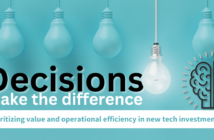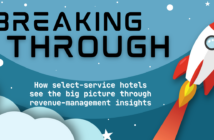Confused about artificial intelligence? Here’s a big-picture look at this continually evolving technology. What can it do for hoteliers? As it turns out, quite a lot. And we’ve only just begun.
by
Artificial Intelligence (AI) is rapidly transforming businesses across virtually all industries. From customer service to product development and marketing, AI is being used to automate tasks, improve efficiency, and make better decisions, emerging as a transformative force that offers numerous possibilities across various industries and professions – including hospitality. Its potential applications extend beyond mere automation, providing businesses with advanced data analytics, personalized user experiences, and streamlined operations. However, as AI continues to evolve, it’s crucial to strike a balance between harnessing its capabilities and addressing the potential pitfalls that may arise from uncontrolled and unregulated implementation.
Based on findings from the sixth annual global research study on artificial intelligence and business strategy by MIT, Sloan Management Review and Boston Consulting Group found employees using AI often feel more competent in their roles, more autonomous in their actions, and more connected to their work, colleagues, partners, and customers.
Here, we’ll highlight and explore the growing prospects of AI in day-to-day business while discussing its potential benefits, likely pitfalls, and inherent risks that warrant responsible regulations to prevent problems.
ASSESSING THE IMPACT
AI has the potential to revolutionize countless professions by augmenting human capabilities, automating repetitive tasks, and enhancing decision-making processes. In healthcare, for example, AI algorithms can analyze vast amounts of medical data, aiding in the diagnosis of diseases, recommending treatment plans, and improving patient outcomes. In customer-facing industries like hospitality, AI-powered chatbots and virtual assistants can enhance customer service, providing personalized recommendations and around-the-clock support.
Furthermore, AI’s predictive capabilities enable businesses to optimize their operations and gain valuable insights from large datasets. For a hotelier working through supply-chain issues or creating financial forecasts, AI algorithms can analyze complex patterns, identify trends, and make accurate predictions, thereby facilitating informed decision-making and improving efficiency. And, for all the recent news about cyberattacks on hotels, AI can play a crucial role in improving digital security by detecting anomalies and identifying potential threats, thus thwarting attacks in real-time. Additionally, AI can play a key role in fraud detection, highlighting fraudulent activity on credit cards and even spotting potential account takeovers.
BREAK IT DOWN
With generative AI showing so much untapped potential (see sidebar) and sometimes-undeserved hype, it’s important to understand what it can do. Here are several areas where this technology is expected to have considerable impact.
- Customer service/automation: Generative AI can be used to create chatbots that can answer customer questions and resolve issues, freeing human customer-service representatives to focus on more complex tasks.
- Product development: Generative AI can be used to create new product ideas, designs, and prototypes, helping businesses bring new products to market faster and more efficiently.
- Marketing: Generative AI can be used to create personalized marketing materials, such as email campaigns and social media ads, helping businesses reach their target audiences more effectively.
IMPLEMENTATION AND LIMITATIONS
Businesses of all stripes and sizes are finding creative ways to implement AI. For better or worse, hospitality has a reputation for being somewhat slow to adopt new technologies, but it seems there are new AI-based developments coming out each day. Accordingly, it’s imperative hoteliers understand the technology and have a plan in place for implementation, because you can bet the competition – short-term rentals, primarily – are already using AI.
However, while AI’s prospects are indeed promising, it’s important to acknowledge and address potential pitfalls associated with uncontrolled and unregulated implementation. One major concern is the potential for biases and discrimination. AI algorithms learn from existing data, and if that data contains biases, the AI systems may perpetuate and amplify them. This can lead to unfair treatment, discrimination, and lawsuits.
One key concern many have about AI is its potential for job displacement. As AI automates certain tasks, there’s a risk of job loss for individuals whose roles become redundant. While AI can create new job opportunities, reskilling and upskilling programs are necessary to equip workers with the necessary skills for these new roles. The end goal for AI shouldn’t be to eliminate jobs; it should be to remove redundant tasks so workers can focus on more meaningful and creative tasks.
Lastly, unregulated AI implementation can pose significant privacy and security risks. AI systems often require vast amounts of personal data to function effectively. If this data is mishandled or falls into the wrong hands, it can lead to privacy breaches, identity theft, and other malicious activities. Stricter regulations and robust data-protection measures are imperative to safeguard individuals’ privacy rights and maintain public trust.
THE FUTURE IS NOW
In addition to the benefits and risks mentioned above, it’s important to remember AI is still a relatively new technology. As it continues to develop, it’s likely we’ll see new and unforeseen applications.
Looking at the big picture, our shared future with AI looks promising with regards to improving productivity, profitability, and bottom-line results, while simultaneously liberating employees from mundane tasks and allowing them to focus on being more creative and examining problems from a human perspective. But it’s important to be aware of the potential risks and plan for the mitigating and managing ethical implications of this technology.
By taking the time to adequately understand the implications of using AI – or the ramifications of ignoring it while competitors deploy it to great effect – we can ensure it’s used to our benefit with minimal negative repercussions. With careful planning, AI can be a boon to businesses to scale transformation and to thrive in the 21st century economy.
Four key areas in which AI can shape a hotel’s day-to-day operations
1. STREAMLINED PROCESSES
AI-driven automation allows hotels to streamline their processes, reduce manual work errors, lower costs, and boost productivity. Given the ongoing labor shortage, this also allows hotels to get by with a less-than-typical number of employees onsite at any time. Further, by automating repetitive and mundane tasks, employees can focus on more creative and strategic endeavors, that can drive innovation, streamline the work processes, and foster sustained growth.
2. A COMPETITIVE EDGE
Through sophisticated algorithms, AI can extract actionable insights from vast amounts of data, enabling hoteliers to identify market trends, guest preferences, and patterns that might have otherwise gone unnoticed. This information empowers hoteliers to make informed, data-driven decisions, develop targeted marketing campaigns, and deliver a personalized guest experience, enhancing customer satisfaction and loyalty.
3. SAFETY AND EFFICIENCY IMPROVEMENTS
Though this is still largely on the horizon, and not yet as applicable to hotels, AI has the potential to increase safety via the implementation of autonomous, AI-driven vehicles. The goal is to eliminate human error in driving, thereby reducing accidents and enhancing transportation efficiency. One day, there will be an autonomous shuttle delivering guest straight from the airport or local sporting venue directly to a hotel.
4. GENERATIVE AI
One of the more exciting aspects of AI is in its generative capacity. Generative AI can create “new” content, such as text, images, music, and more. It has the potential to revolutionize countless industries and is relevant for hoteliers as it’s conceivable to use the technology to generate reliably accurate profiles of new guests based before they’ve ever set foot on the property.





